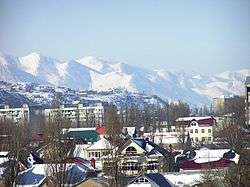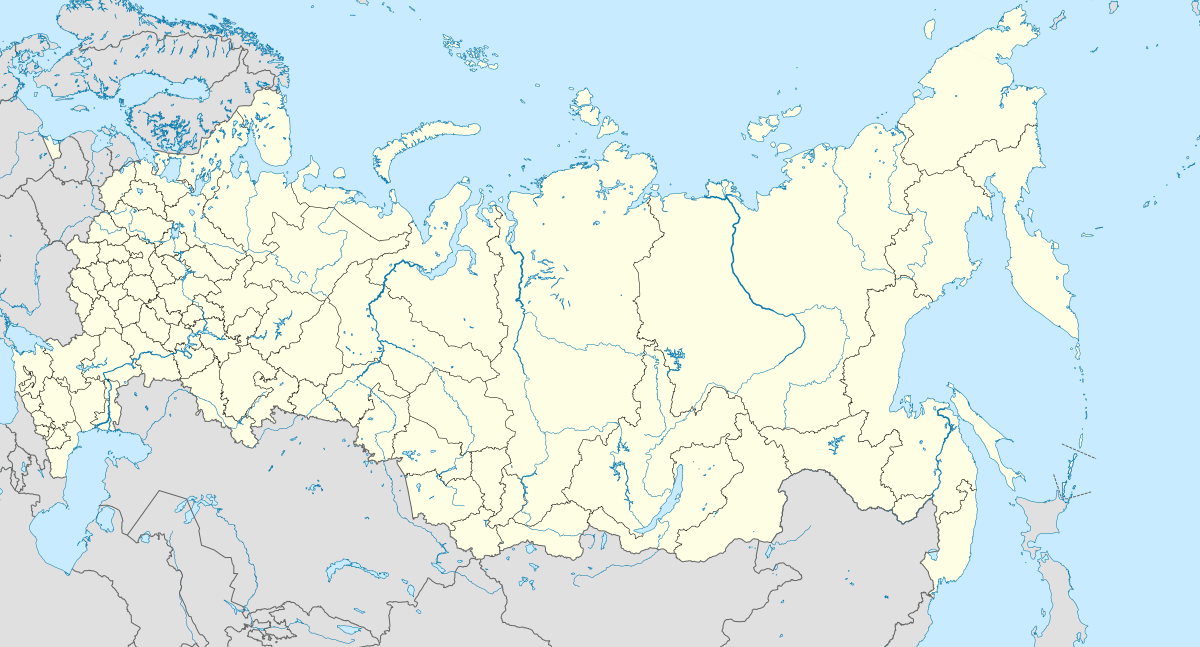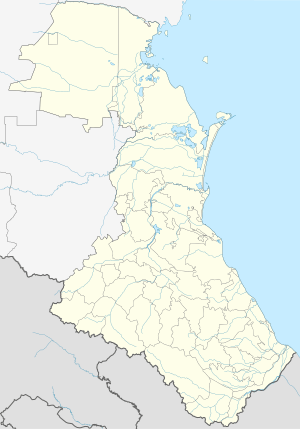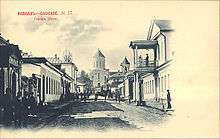Buynaksk
Buynaksk (Russian: Буйна́кск; Kumyk: Шура/Темирхан-Шура, Shura/Temirkhan-Shura) is a town in the Republic of Dagestan, Russia, located at the foothills of the Greater Caucasus on the Shura-Ozen River, 40 kilometers (25 mi) southwest of the republic's capital Makhachkala. Population: 62,623 (2010 Census);[3] 61,437 (2002 Census);[8] 56,783 (1989 Census);[9] 40,000 (1970).
Buynaksk Буйнакск | |
|---|---|
Town[1] | |
| Other transcription(s) | |
| • Kumyk | Шура/Темирхан-Шура |
 Buynaksk in Winter | |
 Coat of arms | |
Location of Buynaksk 
| |
 Buynaksk Location of Buynaksk  Buynaksk Buynaksk (Republic of Dagestan) | |
| Coordinates: 42°49′N 47°07′E | |
| Country | Russia |
| Federal subject | Dagestan[1] |
| Founded | 1834[2] |
| Town status since | 1866[2] |
| Elevation | 490 m (1,610 ft) |
| Population | |
| • Total | 62,623 |
| • Estimate (2018)[4] | 65,080 (+3.9%) |
| • Rank | 255th in 2010 |
| • Subordinated to | Town of Buynaksk[1] |
| • Capital of | Buynaksky District[1], Town of Buynaksk[1] |
| • Urban okrug | Buynaksk Urban Okrug[5] |
| • Capital of | Buynaksk Urban Okrug[5], Buynaksky Municipal District |
| Time zone | UTC+3 (MSK |
| Postal code(s)[7] | 368220 |
| OKTMO ID | 82705000001 |
| Website | buynaksk05 |
History

Before 1922 Buynaksk was known as Temir-Khan-Shurá (Темир-Хан-Шура), that is, the lake or cliff of Tamerlane who is said to have camped here in 1396 after defeating Tokhtamysh during the Tokhtamysh-Timur war. It first appears in Russian annals in the 1590s when Muscovite ambassadors passed nearby on their way to Georgia. It remained a small town ruled by a Bek. In 1830 the Russians destroyed it when it sided with Kazi Mulla. In 1832 a Russian force under Klugenau camped here during Rosen's raid on Gimry. In 1834 Klugenau built a fort on the rock above the lake and it soon became the headquarters of the Apsheron Regiment and the most important Russian fort in the interior of Degestan during the Murid War. In 1849 Hadji Murad led a daring raid into the town. The place was unhealthy and Argutinsky drained the lake in 1858 to prevent the spread of disease.[10] It was granted town status in 1866.[2] In 1920, it was the center of the ephemeral Mountainous Republic of the Northern Caucasus. On November 13, 1920, the government of the Russian SFSR declared Dagestan's autonomy during the congress of the Dagestani people, which took place in Temir-Khan-Shura. In 1922, the town was renamed Buynaksk in honor of a revolutionary Ullubiy Buynaksky. In May 1970, Buynaksk was badly damaged by an earthquake.
In 1999, a car bomb outside an apartment building housing the families of military officers killed sixty-four people.[11]
On August 13, 2009, Buynaksk was the site of two attacks associated with the growing violence throughout Dagestan and neighboring Chechnya. About ten men first opened fire with automatic weapons on a police post, killing four officers. The gunmen then entered a nearby sauna complex and killed seven female employees.[12]
Three soldiers were killed, and thirty-two were wounded, in a suicide car-bombing at a military base in the city on September 5, 2010. The driver of a Zhiguli car smashed through a gate at the base and headed for an area where soldiers were quartered in tents. Soldiers opened fire on the car before it reached the center of the base. The driver then rammed the car into a military truck, where it exploded. After the blast, a roadside bomb hit a car taking investigators to the scene, but no injuries were reported in the second explosion.[11] However, attackers claimed killing 56 Russian soldiers by the bombing.[13]
Administrative and municipal status
Within the framework of administrative divisions, Buynaksk serves as the administrative center of Buynaksky District, even though it is not a part of it.[1] As an administrative division, it is incorporated separately as the Town of Buynaksk—an administrative unit with the status equal to that of the districts.[1] As a municipal division, the Town of Buynaksk is incorporated as Buynaksk Urban Okrug.[5]
Demographics
Ethnic groups (2002 census):[14]
Climate
Buynaksk has a humid continental climate (Köppen climate classification: Dfa).
| Climate data for Buynaksk | |||||||||||||
|---|---|---|---|---|---|---|---|---|---|---|---|---|---|
| Month | Jan | Feb | Mar | Apr | May | Jun | Jul | Aug | Sep | Oct | Nov | Dec | Year |
| Average high °C (°F) | 1.0 (33.8) |
1.9 (35.4) |
6.4 (43.5) |
13.7 (56.7) |
20.4 (68.7) |
24.8 (76.6) |
27.6 (81.7) |
26.6 (79.9) |
21.6 (70.9) |
15.5 (59.9) |
8.5 (47.3) |
3.7 (38.7) |
14.3 (57.8) |
| Daily mean °C (°F) | −2.2 (28.0) |
−1.3 (29.7) |
3.0 (37.4) |
9.2 (48.6) |
15.9 (60.6) |
20.2 (68.4) |
23.1 (73.6) |
22.3 (72.1) |
17.1 (62.8) |
11.5 (52.7) |
5.2 (41.4) |
0.7 (33.3) |
10.4 (50.7) |
| Average low °C (°F) | −5.3 (22.5) |
−4.4 (24.1) |
−0.4 (31.3) |
4.8 (40.6) |
11.4 (52.5) |
15.6 (60.1) |
18.6 (65.5) |
18.0 (64.4) |
12.7 (54.9) |
7.6 (45.7) |
2.0 (35.6) |
−2.2 (28.0) |
6.5 (43.8) |
| Average precipitation mm (inches) | 17 (0.7) |
23 (0.9) |
22 (0.9) |
30 (1.2) |
58 (2.3) |
65 (2.6) |
53 (2.1) |
42 (1.7) |
51 (2.0) |
41 (1.6) |
30 (1.2) |
19 (0.7) |
451 (17.9) |
| Source: Climate-Data.org [15] | |||||||||||||
References
Notes
- Law #16
- "General Information" (in Russian). Republic of Dagestan. Retrieved September 3, 2017.
- Russian Federal State Statistics Service (2011). "Всероссийская перепись населения 2010 года. Том 1" [2010 All-Russian Population Census, vol. 1]. Всероссийская перепись населения 2010 года [2010 All-Russia Population Census] (in Russian). Federal State Statistics Service.
- "26. Численность постоянного населения Российской Федерации по муниципальным образованиям на 1 января 2018 года". Federal State Statistics Service. Retrieved January 23, 2019.
- Law #6
- "Об исчислении времени". Официальный интернет-портал правовой информации (in Russian). June 3, 2011. Retrieved January 19, 2019.
- Почта России. Информационно-вычислительный центр ОАСУ РПО. (Russian Post). Поиск объектов почтовой связи (Postal Objects Search) (in Russian)
- Russian Federal State Statistics Service (May 21, 2004). "Численность населения России, субъектов Российской Федерации в составе федеральных округов, районов, городских поселений, сельских населённых пунктов – районных центров и сельских населённых пунктов с населением 3 тысячи и более человек" [Population of Russia, Its Federal Districts, Federal Subjects, Districts, Urban Localities, Rural Localities—Administrative Centers, and Rural Localities with Population of Over 3,000] (XLS). Всероссийская перепись населения 2002 года [All-Russia Population Census of 2002] (in Russian).
- "Всесоюзная перепись населения 1989 г. Численность наличного населения союзных и автономных республик, автономных областей и округов, краёв, областей, районов, городских поселений и сёл-райцентров" [All Union Population Census of 1989: Present Population of Union and Autonomous Republics, Autonomous Oblasts and Okrugs, Krais, Oblasts, Districts, Urban Settlements, and Villages Serving as District Administrative Centers]. Всесоюзная перепись населения 1989 года [All-Union Population Census of 1989] (in Russian). Институт демографии Национального исследовательского университета: Высшая школа экономики [Institute of Demography at the National Research University: Higher School of Economics]. 1989 – via Demoscope Weekly.
- John F. Baddeley, "The Rugged Flanks of the Caucasus", 1940, Chapter XIII
- The Guardian. September 5, 2010. Three Russian Soldiers Die in Blast Retrieved September 5, 2010
- The New York Times : 14 August 2009 : Clashes Kill Over 20 in Russia Region Retrieved September 5, 2010
- Kavkazcentr
- http://www.ethno-kavkaz.narod.ru/rndaghestan.html
- "Climate: Buynaksk". Retrieved February 27, 2016.
Sources
- Народное Собрание Республики Дагестан. Закон №16 от 10 апреля 2002 г. «Об административно-территориальном устройстве Республики Дагестан», в ред. Закона №106 от 30 декабря 2013 г. «О внесении изменений в некоторые законодательные акты Республики Дагестан». Вступил в силу со дня официального опубликования. Опубликован: "Дагестанская правда", №81, 12 апреля 2002 г. (People's Assembly of the Republic of Dagestan. Law #16 of April 10, 2002 On the Administrative-Territorial Structure of the Republic of Dagestan, as amended by the Law #106 of December 30, 2013 On Amending Various Legislative Acts of the Republic of Dagestan. Effective as of the day of the official publication.).
- Народное Собрание Республики Дагестан. Закон №6 от 13 января 2005 г. «О статусе и границах муниципальных образований Республики Дагестан», в ред. Закона №43 от 30 апреля 2015 г. «О статусе городского округа с внутригородским делением "Город Махачкала", статусе и границах внутригородских районов в составе городского округа с внутригородским делением "Город Махачкала" и о внесении изменений в отдельные законодательные акты Республики Дагестан». Вступил в силу со дня официального опубликования. Опубликован: "Дагестанская правда", №8, 15 февраля 2005 г. (People's Assembly of the Republic of Dagestan. Law #6 of January 13, 2005 On the Status and Borders of the Municipal Formations of the Republic of Dagestan, as amended by the Law #43 of April 30, 2015 On the Status of the "City of Makhachkala" Urban Okrug with Intra-Urban Divisions, the Status and the Borders of the Intra-City Districts Comprising the "City of Makhachkala" Urban Okrug with Intra-Urban Divisions, and on Amending Various Legislative Acts of the Republic of Dagestan. Effective as of the day of the official publication.).